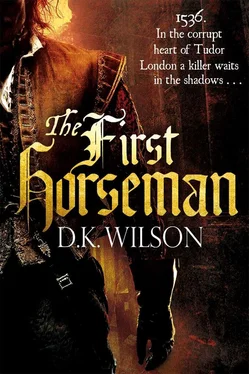D. Wilson - The First Horseman
Здесь есть возможность читать онлайн «D. Wilson - The First Horseman» весь текст электронной книги совершенно бесплатно (целиком полную версию без сокращений). В некоторых случаях можно слушать аудио, скачать через торрент в формате fb2 и присутствует краткое содержание. Год выпуска: 2013, ISBN: 2013, Издательство: Little, Brown Book Group, Жанр: Исторический детектив, на английском языке. Описание произведения, (предисловие) а так же отзывы посетителей доступны на портале библиотеки ЛибКат.
- Название:The First Horseman
- Автор:
- Издательство:Little, Brown Book Group
- Жанр:
- Год:2013
- ISBN:9781405518871
- Рейтинг книги:5 / 5. Голосов: 1
-
Избранное:Добавить в избранное
- Отзывы:
-
Ваша оценка:
- 100
- 1
- 2
- 3
- 4
- 5
The First Horseman: краткое содержание, описание и аннотация
Предлагаем к чтению аннотацию, описание, краткое содержание или предисловие (зависит от того, что написал сам автор книги «The First Horseman»). Если вы не нашли необходимую информацию о книге — напишите в комментариях, мы постараемся отыскать её.
The First Horseman — читать онлайн бесплатно полную книгу (весь текст) целиком
Ниже представлен текст книги, разбитый по страницам. Система сохранения места последней прочитанной страницы, позволяет с удобством читать онлайн бесплатно книгу «The First Horseman», без необходимости каждый раз заново искать на чём Вы остановились. Поставьте закладку, и сможете в любой момент перейти на страницу, на которой закончили чтение.
Интервал:
Закладка:
‘I have an idea that might work,’ I explained. ‘My mother is away at our country house with a small household. It’s very quiet there and my mother would value the company. If we tidy Lizzie up… some respectable clothes… Do you not think she could be made very presentable?’
‘I have little experience of ladies,’ Ned said, ‘but I think your mother would not be easily fooled.’
‘My mother, alas, is failing in mind. Sometimes she does not even know me.’
Ned stood for several moments, his brow furrowed. ‘Thomas,’ he said at last, ‘I have seen what evil tricks guilt can play. I have watched brothers punish their bodies and minds with self-imposed penances. Scourging and hair shirts are all very well for the saints but they are not right for all of us.’
‘I’m not suggesting this to quiet my own conscience,’ I replied. ‘At least I don’t think so. You heard what Lizzie said about me…’
‘She is bitter and frightened…’
‘I know what she fears.’ I recalled our visit to the unmarried women’s burial plot. ‘I want to deliver her from that fear if I can. That much I owe her. Do you have a better plan?’
Ned’s mournful silence was my answer.
‘Then will you try to persuade her to give my plan a try?’
Chapter 8
The next day I arrived at Robert’s house in Sopers Lane in good time for our appointment with the Wardens of the Goldsmiths’ Company. I was shown into the garden where his wife Margaret sat reading beneath a mulberry tree, which was just coming into full leaf. She rose to greet me and, in so doing, let slip her book. When I retrieved it she took it hastily, closed it and, placing it beside her, covered it with a piece of tapestry she had been sewing, but not before I had read the name ‘Luther’ on the fly leaf.
Margaret, a plump lady in her forties, was as serious in her demeanour as her husband. ‘I am sorry Robert is not back yet,’ she said as I seated myself at her side. ‘He had to go to Bakewell Hall. A consignment of cloths in from Suffolk, I believe. You know how it is when the clothiers arrive; all the dealers converge like wasps on a honey pot. Of course, if it had not been the clothiers, it would have been Mercers’ Company business, or City Council business or parliament — you did know he’s back in the Commons house? — and as if that wasn’t enough there always seem to be little jobs to do for Master Cromwell. What with one thing or another we rarely see him these days. ’Tis particularly hard on his children.’
When she paused to draw breath, I said, ‘I know how busy he is. I feel guilty that this little affair of mine is taking up still more of his time.’
‘Oh, no, Thomas, you must not think that. Robert is very happy to help. He was so very fond of your father. He regards you as almost one of his own children.’
At that moment Robert appeared from the house, striding over the newly scythed grass with his usual purposeful gait. As soon as he had greeted us, Mistress Packington took her cue and returned indoors. Robert took her place on the bench.
‘Now,’ he began, in his usual brisk manner, ‘I have made enquiries into Brother Simon Leyland and the business he runs with his younger brother. It seems that they are not the most scrupulous merchants in London. There was a case of false weights a few years ago which they managed to escape with a small fine. Their clients include some of the highest in the land and that has created problems for them.’
‘How so?’
‘They have lent to members of the king’s council and court who have been less than prompt in making repayment. As a result they have been obliged to borrow secretly from foreign merchants. They desperately need new customers.’
‘Which explains why they have been poaching mine.’
‘Exactly. Now, we cannot make accusations at your hearing. The Leylands are not under examination. But we might be able to make subtle references that the Court are sure to recognise.’
‘Why do you say “we”?’ I asked.
‘You’ve never been present at a meeting of the Court of Assistants, I suppose.’
‘No, I thank God. No one is summoned before that august body unless he is in real trouble.’
Robert allowed himself a slight smile. ‘You should not be too much in awe of them; they are only a dozen fallible present and past wardens and they have to overlook every aspect of the Company’s life. They will have several other matters on their agenda today. I suggested to the Prime Warden that your affair might be dealt with more expeditiously if I were to speak on your behalf.’
‘But you are not of our fellowship,’ I protested.
‘The rules permit you to have an advocate present and they do not specify that he must be a member of the Company. So, I will be beside you and I suggest you take your lead from me. Above all else be sure to appear humble and contrite.’
We spent several more minutes discussing the forthcoming ordeal and, after a light dinner that I was too nervous to do much justice to, we set off for Goldsmiths’ Hall. My examination by the Wardens’ Court took place in what was called the Ladies’ Chamber, a first-floor parlour of large size but comfortably furnished. It was here that members’ wives and daughters were entertained and where the Court held meetings.
After a short wait we were admitted. The new Prime Warden, Sir John Mundy, sat behind a long table, flanked by eleven of his colleagues, all wearing their blue scarlet-hooded robes of office. At one end a scribe was stationed. The only sound was the scratching of his pen. Robert and I stood in the middle of the room.
Eventually Mundy looked up with a grave half-smile. ‘Master Packington, it is an honour to welcome you. Brother Treviot is extremely fortunate to have you as his advocate.’ Mundy directed his gaze at me and the smile faded. ‘Brother Treviot, it is not the custom of this Worshipful Company to pass judgement on the private lives of members. We are interested only in preserving the high standards of workmanship and business practice for which we are justly famous. However, when the conduct of a brother attracts unfavourable comment and impairs his relationship with other members as well as customers, we have to take note of it. Do you understand?’
‘Yes, sir.’ I stood, looking, I hoped, suitably abashed, my eyes fixed on the herb-strewn floor.
The Prime Warden continued. ‘It has been noted for some months that you have neglected your shop and effectively delegated the conduct of business to someone who is not a freeman. Furthermore, you have been recognised paying frequent visits south of the river to a place of disrepute, as one result of which you absented yourself from the St Dunstan’s Day assembly. All this may suggest to some observers that you have scant regard for the privileges and responsibilities of membership of this Worshipful Company. If this council failed to take action it might appear that we condoned such a casual attitude. Can you produce any explanation that might influence the decision we have to reach?’
Robert now intervened. ‘Masters, not twelve months since, your Worshipful Company and, indeed, the whole merchant community of the City suffered an irreplaceable loss in the death of the older Thomas Treviot. That loss, however, was as nothing compared with that sustained by his family. Before his grieving son could recover from that blow he sustained another in the decease of his young wife. The wise Solomon tells us, “There is a time for sadness and a time for mirth; a time to grieve and a time to dance.” Who can say how long these times, set by God, should last? Grief may be like a cave a man enters, hoping to pass through it and emerge into the sunlight once more. Yet, if the cave be long and beset with twists and turns, he may despair of ever escaping from the dark. Such despair may turn to madness. Masters, should not those of us who are older and have seen more of the world’s trials be lights in the darkness?’
Читать дальшеИнтервал:
Закладка:
Похожие книги на «The First Horseman»
Представляем Вашему вниманию похожие книги на «The First Horseman» списком для выбора. Мы отобрали схожую по названию и смыслу литературу в надежде предоставить читателям больше вариантов отыскать новые, интересные, ещё непрочитанные произведения.
Обсуждение, отзывы о книге «The First Horseman» и просто собственные мнения читателей. Оставьте ваши комментарии, напишите, что Вы думаете о произведении, его смысле или главных героях. Укажите что конкретно понравилось, а что нет, и почему Вы так считаете.












